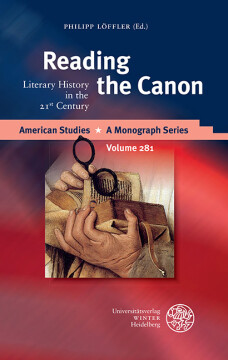
BUCH
Reading the Canon
Literary History in the 21st Century
Herausgeber: Löffler, Philipp
American Studies – A Monograph Series, Bd. 281
2017
Zusätzliche Informationen
Bibliografische Daten
Abstract
‘Reading the Canon’ explores the relation between the production of literary value and the problem of periodization, tracing how literary tastes, particular reader communities, and sites of literary learning shape the organization of literature in historical perspective. Rather than suggesting a political critique of the canon, this book shows that the production of literary relevance and its tacit hierarchies of value are necessary consequences of how reading and writing are organized as social practices within different fields of literary activity. ‘Reading the Canon’ offers a comprehensive theoretical account of the conundrums still defining contemporary debates about literary value; the book also features a Series of historically-inflected author studies—from classics, such as Shakespeare and Thomas Pynchon, to less likely figures, such as John Neal and Owen Johnson—that illustrate how the idea of literary relevance has been appropriated throughout history and across a variety of national and transnational literary institutions.
Inhaltsverzeichnis
| Zwischenüberschrift | Seite | Aktion | Preis |
|---|---|---|---|
| Cover | C | ||
| Title Page | III | ||
| Copyright | IV | ||
| TABLE OF CONTENTS | V | ||
| ACKNOWLEDGMENTS | IX | ||
| PHILIPP LÖFFLER: Introduction: The Practice of Reading and the Need for Literary Value | 1 | ||
| I PERIODIZATION, PRESTIGE, GENRE | 21 | ||
| CLEMENS SPAHR: Literary History and the Problem of Periodization | 23 | ||
| GÜNTER LEYPOLDT: Singularity and the Literary Market | 47 | ||
| MICHAEL BASSELER: Literary Canons and the Dynamics of Generic Change | 71 | ||
| II CLASSICS IN THE CLASSROOM | 103 | ||
| PETER PAUL SCHNIERER: Shakespeare’s Complete Works: Canonization, Completion and Collection in the Twenty-First Century | 105 | ||
| JOHANNES VÖLZ: The Uses of Emerson: Transcendentalism, Transnationalism, and the New Americanists | 115 | ||
| HEIKO JAKUBZIK: Edgar Allan Poe and the Rise of Detective Fiction | 151 | ||
| SASCHA PÖHLMANN: Canon Fodder: Thomas Pynchon, Unpopular Culture, and the Invention of Postmodernism | 167 | ||
| III IN THE NAME OF DIVERSITY | 187 | ||
| FRANZISKA SCHMID: Sherman Alexie and the Uses of Native American Literature | 189 | ||
| KATHARINA GERUND: Contested Canons? Toni Morrison and the Nobel Prize in Germany | 215 | ||
| CAROLINE LUSIN: Canon and Carnival: Challenging Hierarchies in Zadie Smith’s ‚NW‘ (2012) | 247 | ||
| JAN RUPP: New Canons for the Classroom: Teaching Black British Writing | 269 | ||
| DIRK WIEMANN: The Great Unread: Indian Writing in English and its Shadow Canons | 293 | ||
| IV LOST FIGURES, UNLIKELY REVIVALS, NEWCOMERS | 313 | ||
| STEFANIE SCHÄFER: John Neal’s ‚Brother Jonathan‘ and the Problem of American Romanticism | 315 | ||
| KARIN HÖPKER: Only in the Chattel Records—Obscurity, Historiography, and Frederick Douglass’s ‚The Heroic Slave‘ | 333 | ||
| TIM SOMMER: Charismatic Authorship: Walter Scott, William Wordsworth, and the Nineteenth-Century Construction of Romantic Canonicity | 363 | ||
| SOPHIE SPIELER: No Longer the ‘Text-Book’ of any Generation: ‚Stover at Yale‘ and the Non-Canonical | 387 | ||
| KIRSTEN HERTEL: Highbrow—Middlebrow—Broadbrow? J.B. Priestley and Cultural Re-Education in Postwar German Theatre | 405 | ||
| ELLEN REDLING: Canonizing Youth in Mark Ravenhill’s Major Plays | 433 | ||
| LIST OF CONTRIBUTORS | 457 |


 Publishing Platform by CloudPublish
Publishing Platform by CloudPublish